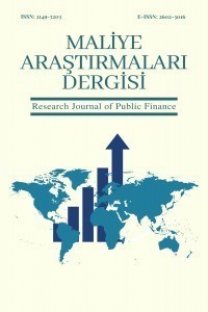Doğrudan Yabancı Yatırımlar ve İş Yapabilme Kolaylığı İlişkisi Üzerine Ampirik Bir İnceleme
İktisadi, sosyal ve politik yaşamın kurgulanmasında esas alınan kurallar ülkelerin ekonomik performanslarını farklılaştırabilmektedir. Bu kuralların etkin biçimde kullanılarak girişimciliğin desteklendiği ve yaratıcı kapasitenin ortaya çıkarılmasının olanaklı olduğu ekonomilerde büyüme ve refah artışının temini mümkündür. Büyüme ve refahın ileri bir düzeye erişebilmesi çoğunlukla doğrudan yatırımların arttırılmasıyla ilişkilendirilmektedir. Dolayısıyla ekonomiyi yönlendirecek olan kuralların, yatırımları kolaylaştıracak biçimde tasarlanması amaca uygun olacaktır.Bu çalışmanın amacı; vergiler ve iş kurabilmek için gerekli prosedürler ile iş yapabilme kolaylığı sıralamasının, net doğrudan yabancı yatırım girişleri üzerindeki etkisini test etmektir. Dünya Bankası verilerinin kullanıldığı ve 2015 yılında en fazla net doğrudan yabancı yatırım alan on ülke için gerçekleştirilen panel veri analizi sonucunda, toplam ödenen vergi sayısı ve işe başlamak için gereken süre ile net doğrudan yabancı yatırımlar arasında istatistiki olarak anlamlı bir ilişkinin varlığı tespit edilmiştir.
Anahtar Kelimeler:
İş Yapabilme Kolaylığı, Net Doğrudan Yabancı Yatırım, Vergi, Panel Veri Analizi
An Empirical Study on the Relationship between Foreign Direct Investments and Ease of Doing Business
Rules that are based on the regulation of economic, social and political life can differentiate the economic performances of countries. Effective use of these rules can provide growth and prosperity in economies where entrepreneurship is supported and that the creative capacities are encouraged. Access to an advanced level of growth and wealth is often associated with increased direct investments. Therefore, it would be appropriate to design the rules that will direct the economy so as to facilitate investments. The purpose of this study is to test the effects of the taxes, procedures for establishing business and the ease of doing business rankings on the net foreign direct investment inflows. As a result of the panel data analysis that conducted by The World Bank data for ten countries with the highest net foreign direct investment in 2015; the total number of tax payments and the time that required to start a business have significant impact on the net foreign direct investment inflows
___
- Baltagi, B.H. (1995). Econometric Analysis of Panel Data, Chichester. John Wiley&Sons Ltdi, West Sussex, England.
- Bayraktar, N. (2013). Foreign Direct Investment and Investment Climate. Procedia Economics and Finance, 5(1992), 83–92.
- Blonigen, B. A., & Piger, J. (2014). Determinants of Foreign Direct Investment. Canadian Journal of Economics, 47(3), 775–812.
- Cheng, H. F., Gutierrez, M., Mahajan, A., Shachmurove, Y., and Shahrokhi, M. (2007). A Future Global Economy to be Built by BRICs. Global Finance Journal, 18(2007), 143– 156.
- Corcoran, A., and Gillanders, R. (2015). Foreign Direct Investment and the Ease of Doing Business. Review of World Economics, 151(1), 103–126.
- Djankov, S., Mcliesh, C., and Ramalho, R. M. (2006). Regulation and Growth. Economics Letters, 92, 395–401.
- Egeli, H.A, Egeli, P.(2007). İhracat-Millî Gelir İlişkisi: Asya Ülkeleri Üzerine Panel Veri Analizi. Uluslararası Asya ve Kuzey Afrika Çalışmaları Kongresi, 10/09/2007- 15/09/2007, Ankara.
- Eifert, B. P. (2009). Do Regulatory Reforms Stimulate Investment and Growth ? Evidence from the Doing Business Data , 2003 – 07 (CGD Working Paper No. 159). Washington DC.
- Gillanders, R., and Whelan, K. (2010). Open For Business? Institutions , Business Environment and Economic Development (UCD Centre for Economic Research Working Paper Series No. WP10/40). Dublin.
- Gujarati, N.D. (2004). Basic Econometrics, McGraw-Hill Inc., New York
- Gujarati, H. (2015). Ease of Doing Business Ranking Reflects The Goodness of the Economy: A Misconception or Fact? In Ease of Doing Business: Contemporary Issues, Challenges and Future Scope (pp. 30–39). Ahmedabad: Gujarat Technological University.
- Jayasuriya, D. (2011). Improvements in the World Bank’s Ease of Doing Business Rankings: Do they Translate into Greater Foreign Direct Investment Inflows ? (Policy Research Working Paper No. 5787). Sydney.
- Korutaro, B., and Biekpe, N. (2013). Effect of Business Regulation on Investment in Emerging Market Economies. Review of Development Finance, 3(1), 41–50.
- Lawless, M. (2009). Tax Complexity and Inward Investment (Research Technical Paper No. 5/RT/09). Dublin.
- Levin A, Lin C.F, Chu C.J (2002) .Unit Root Tests In Panel Data: Asymptotic and Finite-Sample Properties. Journal of Econometrics, 108, 1-24.
- Morisset, J., and Neso, O. L. (2002). Administrative Barriers to Foreign Investment in Developing Countries (Policy Research Working Paper No. WPS2848). Washington DC.
- Morris, R., and Aziz, A. (2011). Ease of Doing Business and FDI Inflow to Sub‐Saharan Africa and Asian Countries. Cross Cultural Management, 18(4), 400–411.
- Nelson, C.R., Plosser, C.I.(1982). Trends and Random Walks in Macroeconomic Time Series— Some Evidence and Implications. Journal of Monetary Economics, 10, 139–162.
- Pesaran, M.H. (2004), General Diagnostic Tests for Cross-section Dependence in Panels. Working Paper, Trinity College, Cambridge.
- Pinheiro-Alves, R., and Zambujal-Oliveira, J. (2012). The Ease of Doing Business Index as a tool for investment location decisions. Economics Letters, 117(1), 66–70.
- Piwonski, K. (2010). Does the “ Ease of Doing Business ” In a Country Influence its Foreign Direct Investment Inflows? Bryant University.
- Quere, B. A., Fontagne, L., and Revil, L. A. (2003). Tax Competition and Foreign Direct Investment (CEPII Working Paper No. 2003–17). Paris.
- Svobodova, L., and Hedvicakova, M. (2015). Doing Business in the Countries of Visegrad Group. Procedia Economics and Finance, 34(15), 453–460.
- Tatoğlu, F.Y.(2005). Sermaye Piyasası’nda Riskin Sınırlı Bağımlı Değişkenli Panel Veri Modelleri İle Analizi. İatanbul Üniversitesi Sosyal Bilimler Enstitüsü Ekonometri Anabilim Dalı, Yayınlanmamış Doktora Tezi, İstanbul.
- World Bank. (2017). Doing Business: Equal Opportunity for All. Washington DC.
- ISSN: 2149-5203
- Yayın Aralığı: Yılda 2 Sayı
- Başlangıç: 2015
- Yayıncı: PESA
Sayıdaki Diğer Makaleler
Mehmet DAĞ, Oktay KIZILKAYA, Selim DEMEZ
Vergi Usul Kanunu’nda Yer Alan Hakları Konusunda Mükelleflerin Farkındalığı
Kanunilik İlkesi Bağlamında Maliye Bakanlığı’nın Usul ve Esas Belirleme Yetkisi
Doğrudan Yabancı Yatırımlar ve İş Yapabilme Kolaylığı İlişkisi Üzerine Ampirik Bir İnceleme
Vergi Aflarının Vergi Uyumuna Etkisi: Kocaeli Örneği
Fikret Deniz ATÇEKEN, Mehmet Emin ALTUNDEMİR, Aykut Hamit TURAN
